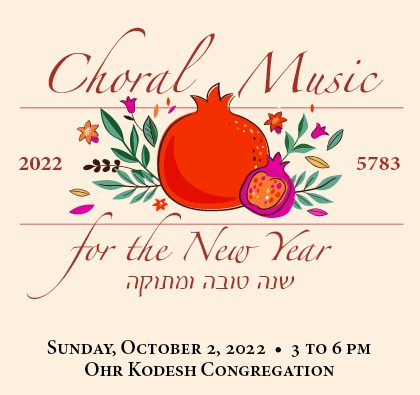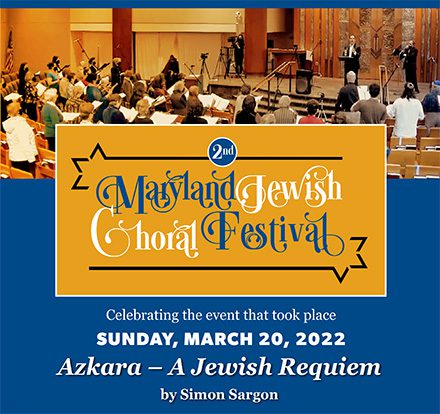Kolot HaLev Videos
Choral Music for the Jewish New Year
Melodies from around the globe, capturing the meaning of ancient Hebrew texts in ways that written words alone cannot.

Yehi Ratzon – May God grant all of us a good and sweet year
Yehi ratzon shetechadeish aleinu shana tovah u’metukah — the wish expressed by Jews the world over as they dip slices of apple into honey on Rosh Hashanah, the Jewish New Year.
Ahot Ketana (“Little Sister”) – Emanuel Abraham Aguilar (London)
Little sister, organize and answer (sing) her praises. Please heal her pain; end the year and its curses. Strengthen and rejoice because the oppression has ended. Wait for the Rock (God), His covenant with You God has kept.
Ascend to Zion and God will proclaim: “Build up, build up the path that leads to Zion.” Make the year begin (only) with blessings.
— Congregation of Israel, Shir haShirim 5:5, Moses’ request on behalf of his sister Miriam, baMidbar 12:13
Special Features
Recent performances – enjoyable and important
Adon Olam (sung to the Ukrainian national anthem)
In dedication to those caught in the grip of the war in Ukraine, attendees at the 2nd Maryland Jewish Choral Festival (March 2022) closed the event with a portion of Adon Olam, a well-known hymn in the Jewish liturgy, set here to the melody of the Ukrainian National Anthem.
Kshe haLev bokhe (when the heart cries)
Kolot haLev and 4 Choirs from Latin America
When the heart cries only God hears, the pain rises out of the soul. A man falls down before he sinks down. With a little prayer (he) cuts the silence: Shma Israel, my God, you’re the omnipotent. You gave me my life, you gave me everything. In my eyes a tear, the heart cries quietly and when the heart is quiet, the soul screams. Shma (Hear) Israel. My God, now I am alone. Make me strong my God; make it that I won’t be afraid.
‘Al Kol Eleh’ – by Israeli musician and songwriter Naomi Shemer
In 1980, to comfort her sister on the loss of her husband, Naomi Shemer composed “Al Kol Eleh” – “For all these things.” It went on to become one of the most popular songs of contemporary Israel. The opening words, ‘Al ha dvash ve-al ha ‘oketz, al ha-mar ve ha matok,’ ‘For the honey and the sting, for the bitter and the sweet,’ have their roots in a midrashic comment on the Book of Numbers (Tanhuma Balak 6).
Azkara – the 2nd Maryland Jewish Choral Festival
The first work of its kind – a requiem honoring the Jewish approach to mourning. We honor its composer, Simon Sargon, who was present for the Festival, but who passed away on December 25th, 2022. May his memory be a for a blessing.

Azkara — A Jewish Requiem” by Simon Sargon
Azkara, a hauntingly beautiful new composition in seven movements by celebrated composer Simon Sargon, is the first Jewish Requiem ever written, expressing the Jewish approach to mourning.
Composer Simon Sargon speaks about his “Azkara — A Jewish Requiem”
Composer Simon Sargon (1938-2022) offers meaningful insights on why and how he composed “Azkara — A Jewish Requiem,” the first Jewish Requiem ever written. Simon Sargon, Professor Emeritus of Composition in Meadows School of the Arts at Southern Methodist University, had a distinguished reputation as a composer, pianist and educator. He held a B.A. from Brandeis University and a master’s degree in composition from the Juilliard School. He taught at the Juilliard School and Sarah Lawrence College and, before arriving in Dallas in 1973, served for three years as chair of the Voice and Opera Department at the Rubin Academy of Music in Jerusalem. As director of music at Temple Emanu-El in Dallas, he created a program of Jewish music that received national acclaim. A prominent voice for music in the community, Simon Sargon presented opera previews for the Dallas Opera and served on the Board of Directors of the Dallas Symphony. In 1983 Sargon joined the music faculty of Meadows School of the Arts as director of the Opera Theatre. With SMU colleagues, he made recordings and concertized extensively. He received the Meadows Foundation Distinguished Teaching Professor Award in 2009.
Getting through the Pandemic
Kolot HaLev – Songs of Hope
Songs of hope from Kolot HaLev’s entire repertoire.
What a Wonderful World
A virtual choir rendition of “What a Wonderful World,” a popular song first recorded by Louis Armstrong.
“What a Wonderful World” was written by Bob Thiele (as “George Douglas”) and George David Weiss.
Kolot HaLev musical director/arranger: Ramón Tasat
Eshet Hayil (A Woman of Valor) | New melody, new approach by Judith Silver
A new melody and new approach to this centuries-old poem honoring the Jewish woman.
In 2020, Kolot haLev commissioned British composer Judith Silver to, in a sense, reimagine Eshet Hayil for the choir. Due to the Covid-19 pandemic, the choir was unable to perform the piece in concert. This video is a virtual choir presentation of an excerpt from Judith Silver’s composition, followed by comments from the composer herself. Eshet Hayil (A Woman of Valor) has been sung by Jews around the world at the Sabbath dinner table on Friday nights. The poem is derived from Proverbs 31, traditionally believed to have been authored by King Solomon.
The commissioning of the piece “Eshet Hayil” was made possible by an anonymous donor in loving memory of Kadimah (Kim) Michelson.
